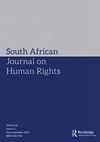Shaping legal and institutional pluralism: land rights, access to justice and citizenship in South Africa
IF 0.6
4区 社会学
Q3 LAW
引用次数: 4
Abstract
Abstract In November 2019, South African President Cyril Ramaphosa signed the Traditional and Khoi-San Leadership Bill into law. The Act forms part of a broader package of recent laws and proposed legislation regulating traditional leadership, which have been strongly critiqued for undermining the property and citizenship rights of South Africans residing in the former homelands. The Act is most strongly contested for providing traditional councils with the power to conclude agreements with companies on behalf of their communities. Mining deals are at the forefront of this debate, and the site of this study. Combining literature study and legal analysis with unique data obtained through interviews and participant observation, this article analyses how the new shape of legal and institutional pluralism affects the rights, strategies and access to justice of rural people in mining areas. It shows how laws regulating traditional authority and mining together paint a veneer of legality over mining deals that in fact infringe on the land rights of rural citizens who, both according to customary law and the Interim Protection of Informal Land Rights Act, have a say regarding their own land. Their residence in so-called traditional communities impedes their enjoyment of the same effective political and property rights as the rest of South Africa’s population.塑造法律和体制多元化:南非的土地权、诉诸司法和公民身份
2019年11月,南非总统西里尔·拉马福萨签署了《传统和科伊桑领导法案》,使之成为法律。该法案是最近一系列更广泛的关于传统领导的法律和拟议立法的一部分,这些法律和拟议立法因破坏居住在前家园的南非人的财产和公民权而受到强烈批评。该法案最受争议的地方在于,它赋予了传统理事会代表其社区与公司签订协议的权力。矿业交易处于这场辩论的前沿,也是本研究的重点。本文结合文献研究和法律分析,结合访谈和参与观察获得的独特数据,分析了法律和制度多元化的新形态如何影响矿区农村人口的权利、策略和诉诸司法。它显示了规范传统权威和采矿业的法律是如何为实际上侵犯农村公民土地权的采矿交易涂上一层合法的外衣的,根据习惯法和《非正式土地权临时保护法案》,农村公民对自己的土地有发言权。他们在所谓传统社区的居住阻碍了他们享有与南非其他人口同样有效的政治和财产权利。
本文章由计算机程序翻译,如有差异,请以英文原文为准。
求助全文
约1分钟内获得全文
求助全文

 求助内容:
求助内容: 应助结果提醒方式:
应助结果提醒方式:


